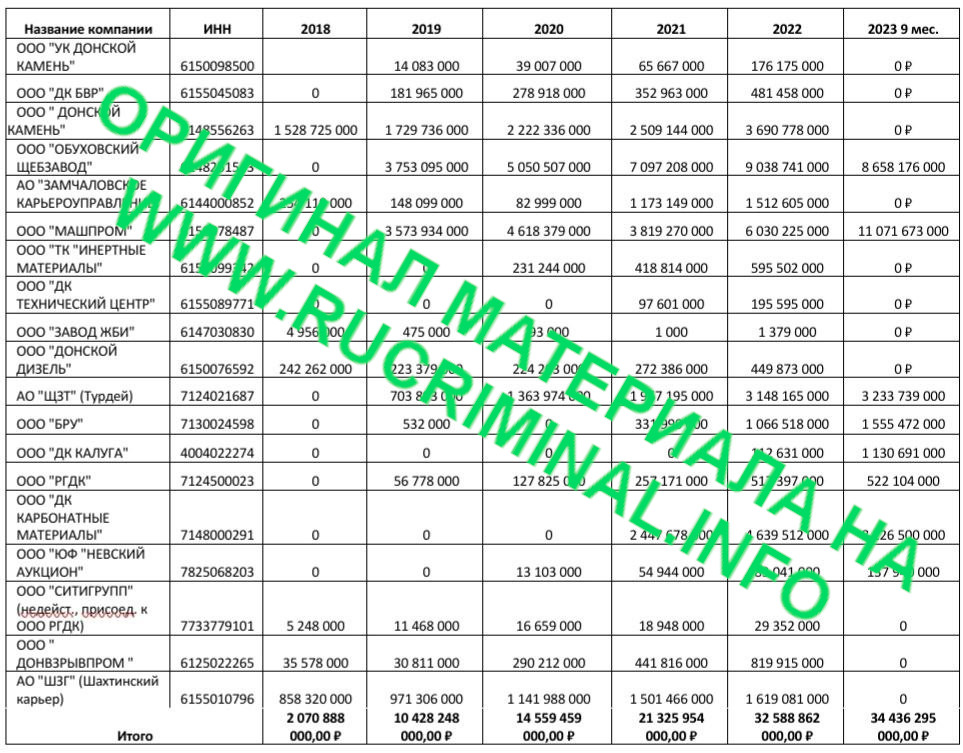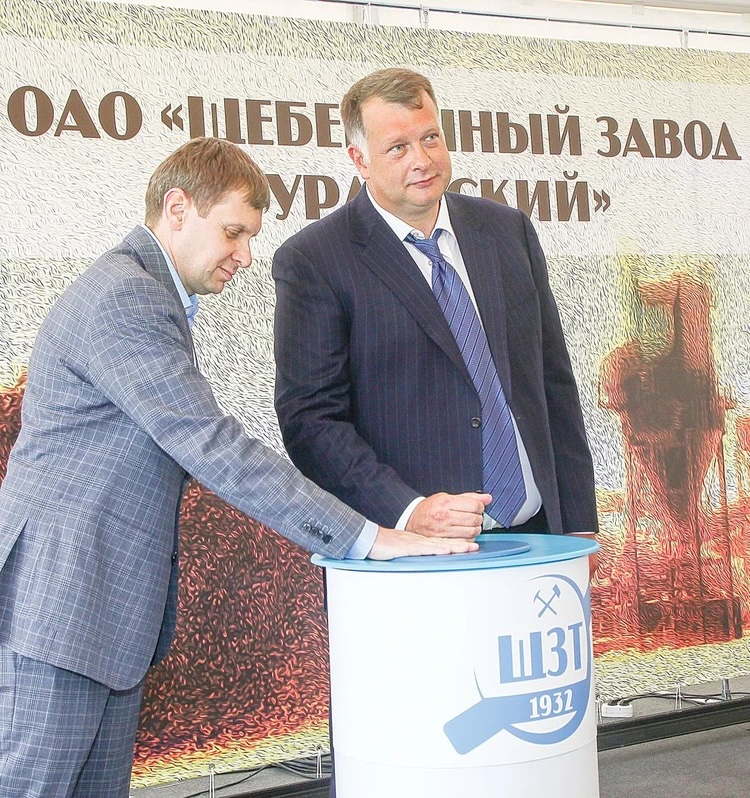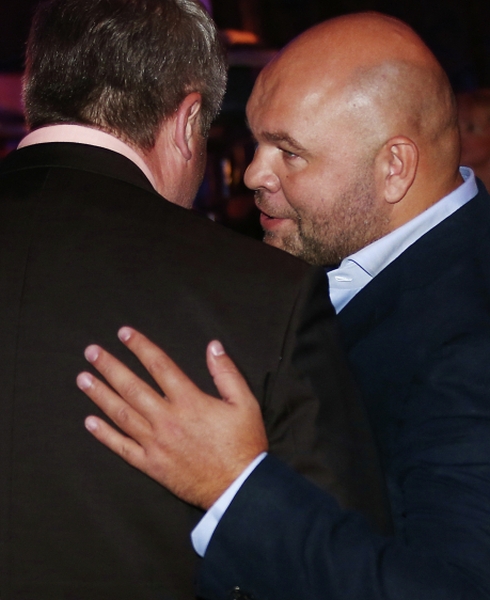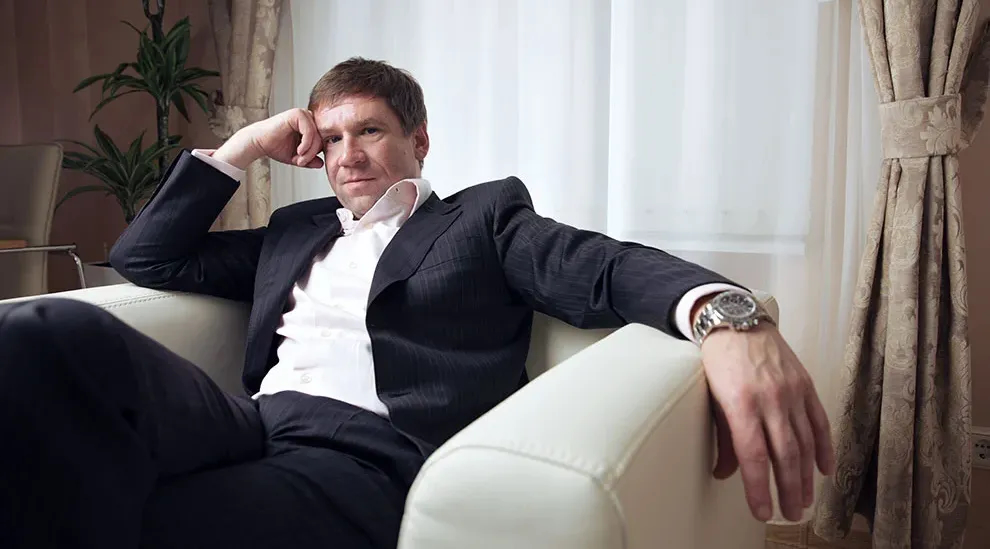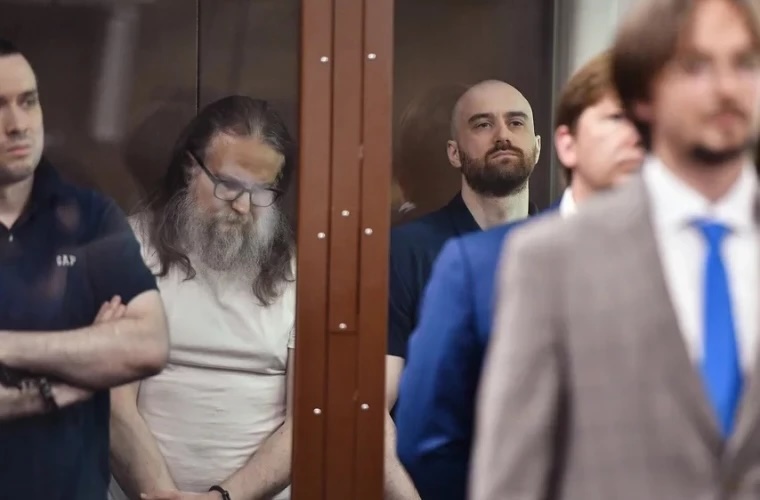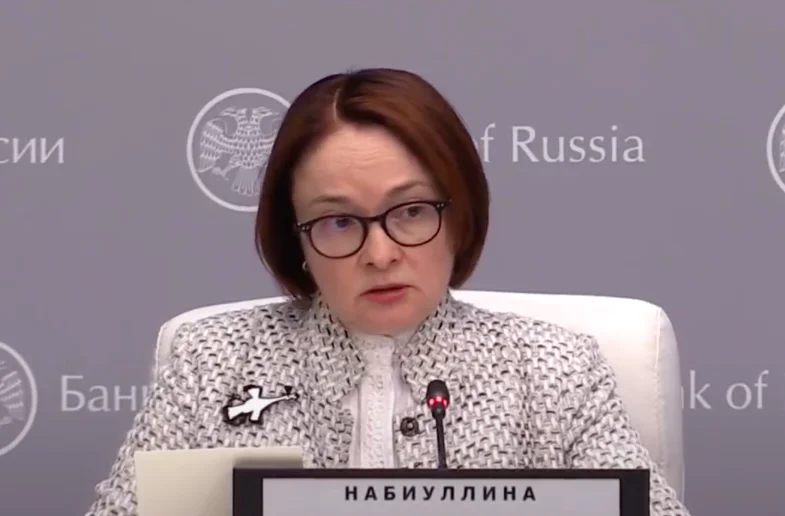Перед исчезновением банкир дал показания на куратора от спецслужб отмывочного канала «Ландромат»

Телеграм-канал ВЧК-ОГПУ опубликовал копию протокола допроса банкира Владимира Антонова по делу «Ландромата». Как мы
выяснили, в декабре 2023 года Антонов загадочно исчез из особняка на Рублевке и с тех пор его никто не видел. Некоторые из близких банкира говорят, что считают, будто его уже нет в живых. В своих показаниях Антонов называет всех известных ему руководителей ЦБ и АСВ, которые имели отношение к «Ландромату»:
«Платон достаточно подробно объяснил мне, что фактически контролирует весь финансовый сектор Республики Молдова, руководство Центрального банка этой страны, а также взаимодействует с сотрудниками Банка России на различных уровнях, а именно с Палеевым Романом Николаевичем (работал в Московском главном территориальном управлении Банка России, подчиненным у Галустьяна Карена Аскеановича и Плякина Алексея Вячеславовича), сотрудником центрального аппарата Банка России Рубиновым Дмитрием, Симановским Алексеем Юрьевичем (заместителем председателя Банка России, курирующим надзор за банками России), Суховым Михаилом Игоревичем (отвечал за лицензионную деятельность российских банков). Все перечисленные должностные лица Банка России отвечали за надзор за кредитными организациями. Также, Платон В.Н. рассказал, что поддерживает близкие отношения с первым заместителем директора АСВ Мирошниковым Валерием Александровичем, который курировал все российские банки, у которых ЦБ отзывал лицензии. Вячеслав хвастался, что он согласовал с влиятельными руководителями МВД России и ФСБ России схему по выводу денежных средств из Российской Федерации транзитом через свои молдавские банки».
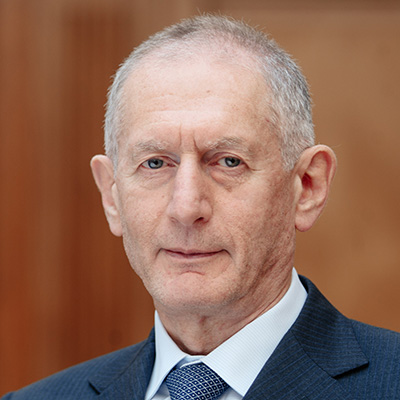
Стоит отметить, что никто из «крыши» «Ландромата» в ЦБ, ФСБ, МВД привлечен к ответственности не был. Как и не были привлечены банкиры, до сих пор тесно сотрудничающие с ФСБ РФ. Также не были привлечены к ответственности клиенты «Ландромата»- чиновники, госкорпорации.
Кто из ФСБ курировал Ландромат? Rucriminal.info
продолжает публиковать расшифровку показаний Владимира Антонова по «елу Ландромата». В этих показаниях Антонов называет одного такого руководителя из ФСБ- это сейчас уже бывший руководитель Управления К ФСБ РФ Виктор Воронин. По версии СД МВД РФ, вторым человеком по значимости в «Ландромате» был банкир Александр Коркин. По показаниям свидетелей, среди прочно он отвечал и за взаимодействие с «крышей» «Ландромата». Антонов прямо говорит, что ближайшей связью Коркин в ФСБ РФ был Воронин.
«По поводу Пахомова, вы лично встречались или нет?
Я лично его видел, но я так понимаю, что это Славин менеджер здесь, он бывший сотрудник ФССП. У Пахомова задача была очень простая – это сформировать пул номинальных директоров компаний, обеспечить бесперебойную работу конструкции. Поэтому, по моему мнению, он не является партнером, а является, скорее, важным, но менеджером.
Вам Платон сам называл какие-то проценты? Может быть, когда предлагал Вам работать по данной схеме?
Он мне предлагал по льготному тарифу 2,5%, дешево. Но мы в 2006 году так все гайки закрутили, что мне это было не нужно. Я ему честно сказал, что Слав, у меня нет того количества клиентов, на которое ты рассчитываешь, и, если честно, то я не собираюсь заниматься этим по двум причинам. Первое, потому что на этом можно подлететь изрядно, второе, у меня тогда с Литовской республикой только начался творческий процесс, экстрадиция в Литву, а Литва это страна ЕС. Это полуавтоматическая процедура, мы там пытались удерживать украинские активы. И я не видел в этом никакой экономики. Эта экономика рано или поздно приводила только в одно место – в тюрьму.
Вопросов нет.
На вопросы адвоката Слепухиной Т.А.:
Вы неоднократно указали, что были крупной организацией, одной из самых больших и громких банковских групп, но я так и не поняла про какую организацию Вы говорили?
Я был собственником Конверс групп, в которую входило 10 банков в 10 странах. Самый известный Снорес, в России он назывался Конверс банк, потом Инвест банк. В Латвии – Латвийский сберегательный банк.
Конверс банк – это было кредитное учреждение РФ или было представительство иностранного банка?
Это Российский банк, у которого была дочка в Великобритании и Украине.
Конверс банк существует или прекратил свое существование?
Он был присоединен к Инвестбанку в 2009 году. В 2010 году Инвестбанк был продан.
То есть с 2010 года Вы не являлись владельцев кредитного учреждения, зарегистрированного на территории РФ?
Являлись, у нас было еще два банка. Енисей, который был позднее у нас похищен, и Байкалинвестбанк. Енисей был в итоге продан Власову и лег по ту же самую историю, а Байкалинвестбанк на сегодняшний день существует и называется Банк Реалист.
Енисей в каком году выбыл из вашего владения?
2012 начало.
А Байкалинвест?
Одновременно в 2012 вместе с Енисеем.
То есть с 2012 года у Вас нет кредитного учреждения на территории РФ?
С 2012 последнее кредитное учреждение, которое у меня было на территории Украины. Все остальные кредитные учреждения нам не принадлежат, контроль над ними либо утрачен, либо потерян.
То есть 2013 году в РФ уже не было кредитных организаций?
Да.
Исходя из Ваших показаний, участником «молдавской схемы» Ваше кредитное учреждение не являлось?
С 2006 года подобные операции были запрещены в группе в целом вообще.
Тем не менее Вы очень подробно рассказываете…
Я очень хорошо ориентируюсь в этом рынке.
Опишите более подробно именно техническую сторону по совершению операций по выводу денежных средств за пределы территории РФ?
Вы открываете в Российском банке, который стоит в этой цепочке простую ООО, которую купили в интернете у таких господ, которых Вы представляете, которые весь сервис начиная с регистрации ООО, соответствующих ОКВЭДов под нее, вам предоставят директора, учредителя, ключи от клиент-банка, вообще все. Вы открываете счет такой ООО. Если Вы не хотите купить такую ООО, то в банке Вам дадут реквизиты под конкретное назначение платежа, который Вам нужен. Вот, вы например можете отправить деньги только за телефон или бумагу, и Вам в банке дадут такую ООО. Дальше вы получаете доступ в клиент-банк, которые называется ГУВРА, главное управление виртуальных расчетов.
А доступ кто предоставляет?
Банк. Банк заводит счет, который называется как вы захотите, не цифровой, и вы получаете такой код/никнейм. Если вы не оптовый клиент, а конечный клиент, ставите рубль безналичный на этот счет, либо на ваш, либо, который вам дали. Внутри вы перебрасываете его как хотите, либо по кор.счетам внутри обвязки. После этого, когда вам нужно что-то куда-то отправить, то вы говорите об этом банку через интернет, либо через голос, как банк работает и как у него это принято. Откупаете валюту и даете реквизиты куда отправить и с каким назначением, это тоже имеет значение.
А покупает валюту юр. Лицо?
Валюту у банка покупает юр.лицо. А банк валюту покупает на бирже. Если это банк не резидент, а Молдинком не резидент, то он покупает через российский банк, который покупает либо на бирже, либо на межбанке.
То есть, по Вашему мнению, юридическое лицо покупает валюту неважно с помощью или без помощи банка, а потом уже купленную валюту перечисляет на расчетный счет другого юридического лица, находящегося уже за пределами РФ?
Можно так. Можно сделать по-другому. Можно сделать резидентным рублем, то есть у вас открыт кор.счет внутри российского банка иностранного банка, а в иностранном банке открыто юр.лицо. Назовем его Ромашка лимитед. (немного пустой болтовни) Молдинком открывает в РЗБ кор.счет. В Молдинкоме открыто юр.лицо. В РЗБ открыто юр.лицо. Соответственно, вы можете сделать операции, связанные с валютным контролем и поставить рубль внутри РЗБ на юр.лицо ,открытое в Молдинкоме. Ставите и дальше уже Молдинком купил валюту у кого захотел, он может сделать прямую интербанк сделку, может сделку через данный российский банк, все зависит от курса и какую фигуру вам поставит банк в конце, и отправил куда захотел.
А платежное поручение должно формировать юр.лицо и оно указывает, что оно хочет от ООО Василек, которое открыто допустим в РЗБ перевести в ООО Ромашка, которое открыто в Молдинкоме в рубля, а вот уже наш российский банк все внутри?
Если у Вас есть Ваше юр.лицо, и Вы берете сами провода клиент-банка, или руками приносите, то тогда да. А если Вы клиент ГУВРА, то нет. То у Вас есть менеджер или интернет канал общения.
Я не про частности исполнения, а в том плане, что все равно должно поступить именно от юридического лица…
Я очень хорошо понимаю к чему Вы клоните, я отвечу на Ваш вопрос по-другому. Эмуляция работы юридических или физических лиц внутри банка и придание им законного вида, это и есть работа Вашего подопечного. Но это всего лишь эмуляция Но если Вы начнете рассматривать цепочку этих компаний, даже не будучи специалистом, Вы очень быстро поймете, что это всего лишь эмуляция. Более того, конечно, надо эмулировать видимость реальной деятельности, реальной банковской деятельности, это безусловно так. По-другому никак не получится. Если Вы говорите о том, что эти все платежи, которые проводили все эти прекрасные банки, они просто не знали что они делали, то это как детская песня.
Я не это спрашивала. Я спрашивала о том, что путь денежных средств формировало сам юридическое лицо…
Либо клиент юридического лица, либо это делал банк для клиента, который не был клиентом банка. В смысле клиентом белого банка, а был клиентом ГУВРА.
Но в любом случае именно изначально при формировании платежного поручения необходимо было указать получателем юридическое лицо в Молдавии?
Можно в Молдавии, можно за границей. Можно в России. Есть не резидентный рубль – не отбитый, есть резидентный рубль – не отбитый. Есть разный доллар, есть разный евро.
На вопросы суда (женщина):
Можно пояснить не посвященным отбитый и не отбитый? Отбитый – это который уже легальный?
Отбитый означает уже прошедший валютный контроль и готовый к отправке.
Он чистый?
Он не чистый. Он прошел валютный контроль, банк проведя валютный контроль разрешает вам купить валюту и отправить вам в точку назначения этот рубль в виде иной любой валюты.
А не отбитый?
А это рубль, который не прошел валютный контроль, то есть деньги поступили на расчетный счет.
А дальнейшего движения не было?
Потому что не предоставлен контракт экспротно/импортный, или основания для платежа за границу. Надо же основания иметь. А у нас платежи за границу разрешены до 50 тысяч долларов без оснований (учеба, лечение). А в данном случае банк должен провести контроль.
То есть на тот счет юр.лица, который открыт в банке зашли деньги, неотбитыве рубли, они отбиты будут тогда, когда под эту сумму будет правовое основание, которое придает легальность всех сделок, и они уже, пройдя контроль, проверив контракты, становятся отбитыми и их уже можно будет перечислять куда заблагорассудится?
Да.
На вопросы адвоката Слепухиной Т.А.:
Но валютный контроль у нас необходим только для внешнеэкономических сделок, правильно?
Да.
Т.е. если у нас перевод от резидента к резиденту, то валютный контроль необходим?
При переводе внутри страны нет.
Здесь нет понятий отбитый и не отбитый рубль?
Это просто рубль.
Из Ваших ответов я не совсем поняла, а в какой банк и какой страны предоставлялись исполнительные листы? Исполнительные листы были выданы Молдавией или Россией?
Нет, ну в конечном счете молдавский исполнительный лист не может быть оплачен в нашей стране без валидации российским судом. Если Вы принесете мне в банк иностранный исполнительный лист, я его не оплачу и не исполню.
В какой банк исполнительный лист какой страны приносился?
В моем понимании российский исполнительный лист в российский банк для того, чтобы примененное решение иностранного суда на территории РФ.
По той описанной молдавской схеме в наш российский банк приносился исполнительный лиц, выданный судом общей юрисдикции или арбитражным судом РФ?
Да.
Судья (женщина):
Товарищ адвокат, все таки это были решения молдавских судов, но которые были соответствующе признаны для исполнения да.
Антонов: есть обратная сторона этой схемы, когда российские деньги не отбитые, находящиеся на кор.счете в молдавском банке списываются по решению молдавского суда в молдавском банке и, соответственно, вы приносите в молдавский банк исполнительный лист или решение молдавского суда в Кишеневе, у вас деньги на кор.счете РЗБ, принадлежащие компании, которая открыва в РЗБ и вы их просто списываете по решению суда. То есть можно так, а можно так.
На вопросы суда (женщина):
Могло быть и то и другое?
Да.
А как было?
Ну быстрее, если были деньги в Молдавии. Просто смотрите, если вы держите остаток на кор.счете в Молдавии, то почему ваши департаменты по оценке рисков не вопят как потерпевшие ,что у вас такие остатки на территории, в которой все банки, мягко говоря, вызывают вопросы. Это же не логично. Почему вы не держите свои деньги в Райфайзене, а держите в Молдавии. И когда вы берете оборотно-сальдовую ведомость и смотрите какие обороты по кор.счетам в нормальных банках у вашего российского банка и в Молдавии. Нет, ну можно, конечно, сказать, что там тарифы ниже.
На вопросы адвоката Слепухиной Т.А.:
Если Вы не участвовали в «молдавской схеме» с 2006 года, то как Вы поясните такое плотное общение с Платоном и с иными фамилиями, которые Вы озвучивали? И в какой период времени это общение было.
С Платоном мы знакомы с середины 2000-х. Я еще раз говорю, он был нашим корреспондентом в Прибалтике и в Панаме, и в Англии, Украине. Мы общались постоянно, у нас были приятельские отношения. В его банках был не только черный бизнес, это был большой банк, они много через нас работали. Более того, у них не было таких корреспондентских счетов, как у нас, а у нас в Прибалтике после 2005 года было очень сложно с американскими счетами. У нас было 5 кор.счетов в Америке. Платили просто дешево, обычные платежи.
В какой период времени Вы очень подробно общались по «молдавской схеме»?
Мы общались со Славой вплоть до моего возвращения сюда и после моего возвращения сюда. Я с ним знаком больше 10 лет и мы с ним поддерживаем взаимоотношения постоянно. До 2015 года точно общались.
Вопросов нет.
На вопросы адвоката Закалюжного Р.С.:
Вы сказали, что вернулись? Вы имеете ввиду РФ?
Да.
А сколько Вы отсутствовали?
С 2009 года с марта по февраль 2015.
Вас в РФ не было?
Нет.
То есть 12,13, 14 год Вы не были?
Нет.
Скажите, пожалуйста, Вы упомянули, что видели Пахомова, в каком году?
В 2015 году, по-моему, в Петербурге. Не помню точно. То ли Петербург, то ли Москва.
Это Вы его первый раз увидели?
Когда я приехал у меня, к сожалению, возникло желание вернуться в тот мир, в котором я изначально развивался как предприниматель, и я уже говорил, что это желание было ошибочным, я начал взаимодействовать со всей абсолютно банковской и околобанковской общественностью. Поэтому при каких обстоятельствах и где точно я не помню, однако, когда мы со Славой в 2012 году обсуждали, позднее в 2013 году, нашу потенциальную возможность участия в этих видах транзакций, так как правда никто не считал, что это плохо, то он неоднократно мне объяснял кто за что у него отвечает на территории РФ.
А для чего он это объяснял?
Для того, чтобы я понимал, если вдруг мы захотим что-то делать, с кем взаимодействовать, и кто эти люди. Вы же чужие деньги берете и куда-то их отправляете, то есть Вы же должны знать.
Так у Вас же не было банка в РФ?
Для того, чтобы заниматься этим видом бизнеса банк не обязателен.
И что Вам рассказал Платон о Пахомове? Я так понимаю, что на тот момент, когда он рассказывал, Вы Пахомова не знали?
Нет. Я и не говорю, что я его знал, и не разу не сказал то, что я его знал и с ним общался. Я говорю лишь о том, что выяснил путем разговоров с Вячеславом о том, что силовой блок устроен так и так, и операционный блок устроен так и так.
У Платона помимо «молдавской схемы» был легальный бизнес в РФ?
На сколько мне известно, у него был набор недвижимости неплохой в РФ, а в основном его бизнес был сконцентрирован в Молдавии и Украине. В Украине у него было достаточно много небанковских активов.
А В РФ?
В РФ мне известно только о недвижимости и финансовых операциях.
Эта недвижимость была жилая или не жилая?
Как правило, когда мне люди рассказывают, что у них есть бизнес-центр Башня Федерация, я сам вопросы не задаю, это как-то не очень вежливо, и мне это было не сильно интересно.
То есть Пахомова в каком-либо из банков Вы никогда не видели?
Лично я – нет.
И с какими директорами каких компаний он общался Вы тоже не знаете?
Лично я – нет.
Вопросов нет.
На вопросы адвоката Голышева:
Согласно Вашим показаниям, Вы познакомились с Соболевым в 2015 году, можете вспомнить месяц?
Я могу точно сказать, что это было лето 2015, потому что в августе 2015 мы начали заниматься Советским, и вопросы по его фин.состоянию возникли довольно быстро, после чего Станислав Метрушин сказал, что эта часть вопросов лежит вне его компетенции.
А сколько раз Вы лично встречались с Соболевым?
Несколько раз. Я не могу точно ответить, точно больше 3, может 4-5.
Все ли Ваши встречи с Соболевым были так или иначе связаны с банком Советским и Вашими интересами?
Одна встреча была связана не с банком Советским, когда Соболев предложил нам пообщаться с Энергомаш банком в СПб. Остальные встречи были связаны только с Советским. Потому, что не было темы, Советский уже был в санации и не о чем было говорить.
В Вашем понимании, когда «молдавская схема» закончила работать?
Думаю, что когда в Молдавии взорвалась банковская система, 2015 год, наверно. Пока работал банк Балтика, надо понять когда у него была отозвана лицензия, это явно было после 2015 года, наверно 2016 год, схема работала.
Известны ли Вам какие-либо факты об участии Соболева в «молдавской схеме» в период 2013-2014 года?
Кроме как информации, которую я Вам только что рассказал, мне не известно иное.
Адвокат еще раз повторил вопрос. Вопрос снят.
В Вашим понимании, участвовал ли Соболев в «молдавской схеме» в период с 2013 по 2014 год включительно?
Поскольку схема работала дольше, в моем понимании, участвовал.
Откуда данная информация, кто Вам ее сообщил?
Я уже отвечал на вопрос откуда я знаю Соболева и информацию о том, какое участие принимал Соболев в этой схеме, я также знаю от того же Григорьева, когда встречался с ним в 2012-2103 годах в городе Лондон.
От кого конкретно кроме Григорьева у Вас имеется информация об участии Соболева в «молдавской схеме»?
От Григорьева и от Митрушина. От Платона.
Когда Вы эту информацию получили?
Первый раз я эту информацию получил от Григорьева в начале-середине 2013, от Митрушина я получил информацию летом в 2015, от Платона я получил информацию после того, как я обнаружил молдавские паспорта и массу интересных сделок с акциями Советского внутри баланса Советского, и сам позвонил Славе в 2015 году в начале сентября.
Лично Вы ни с какими фактами, которые свидетельствуют о причастности Соболева к Молдавской схеме Вы не сталкивались?
Нет.
Подтверждаете ли Вы наличие между Вами и Соболевым конфликта, имеющего отношение к банку Советский?
Нет.
Вопросов нет.
На вопросы адвоката Гравина:
Скажите, пожалуйста, Вы с Коркиным лично встречались?
По делам нет.
Вы Коркина до сегодняшнего дня лично видели?
Да.
Когда и при каких обстоятельствах?
Я видел, наверно, в году 2010 на мероприятиях, когда мы еще поддерживали взаимоотношения с Горбунцовым еще у нас шло общение. Это было какое-то из мероприятий в каких-то тусовочных местах или ресторанах в Москве.
Вы же говорите что с 2009 года…
Я же приезжал. Мы же работали здесь, родители здесь.
При каких обстоятельствах?
Бытовых.
При каких обстоятельствах Вы познакомились в 2010 с Коркиным?
Мы достаточно плотно общались с Горбунцовым, Менделеевым, и посещали совместные мероприятия, поскольку тусовка была одна, ничего плохого. Коркин попадал в наше поле зрения, поле зрения службы безопасности потому, что служба безопасности вынесла достаточно негативное мнение относительно жизнедеятельности этого человека. Мы не общались дальше. Более того, о Коркине мне рассказывал Чувилин, что мне бы надо бы пообщаться с Коркиным и урегулировать свои вопросы с господином Ворониным. Это руководитель управления К СЭБ ФСБ России. Это ровно те люди, которые занимаются курированием банковского и финансового сектора РФ и ЦБ РФ.
На тусовках, когда Вы общались с Коркиным, он Вам рассказывал…
Я разве сказал, что я с ним общался, я сказал, что я видел.
Виделись, но по делам не общались?
Нет.
Почему Коркин попал в поле зрения Вашей службы безопасности?
Служба безопасности обязана была отслеживать всех кто окружал меня. Поскольку были разные ситуации в жизни, любой контрагент проверялся всецело и со всех сторон».
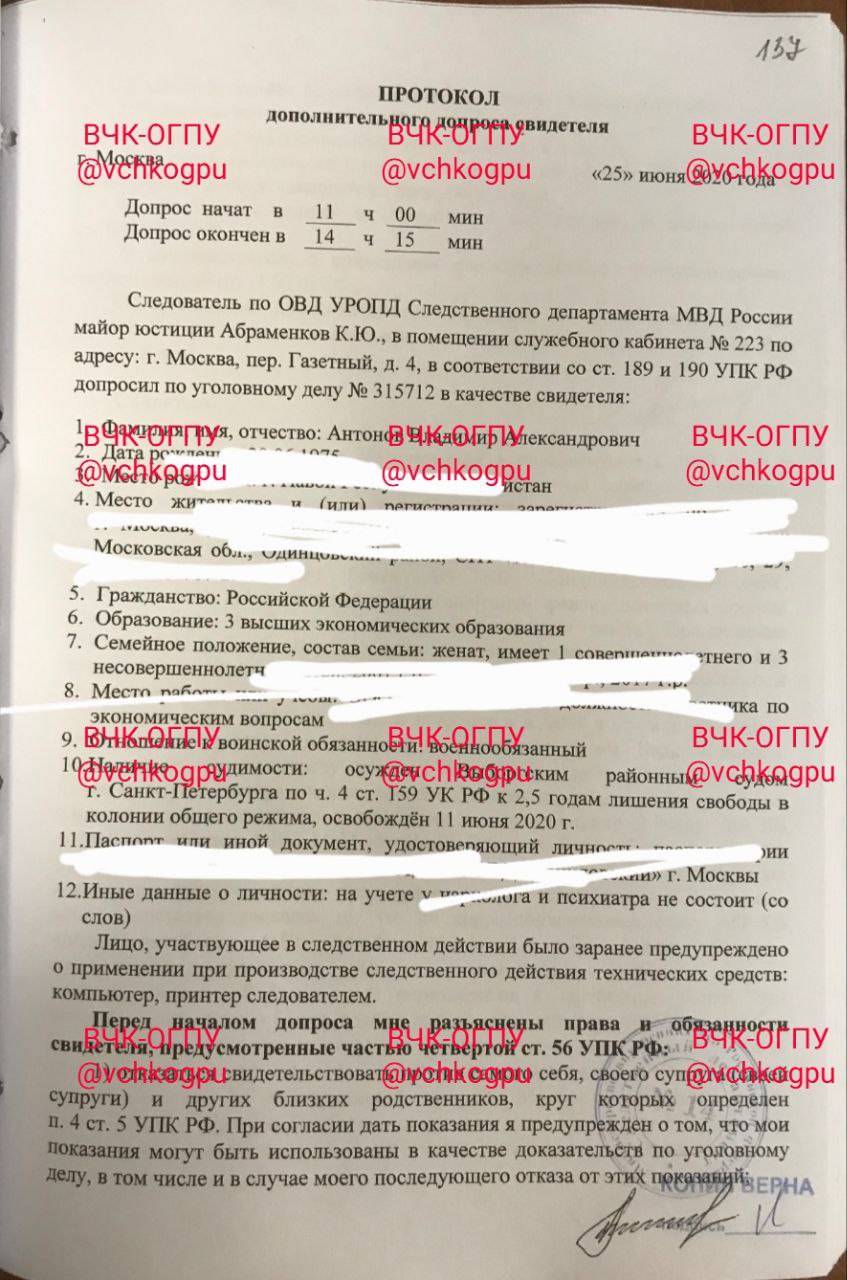
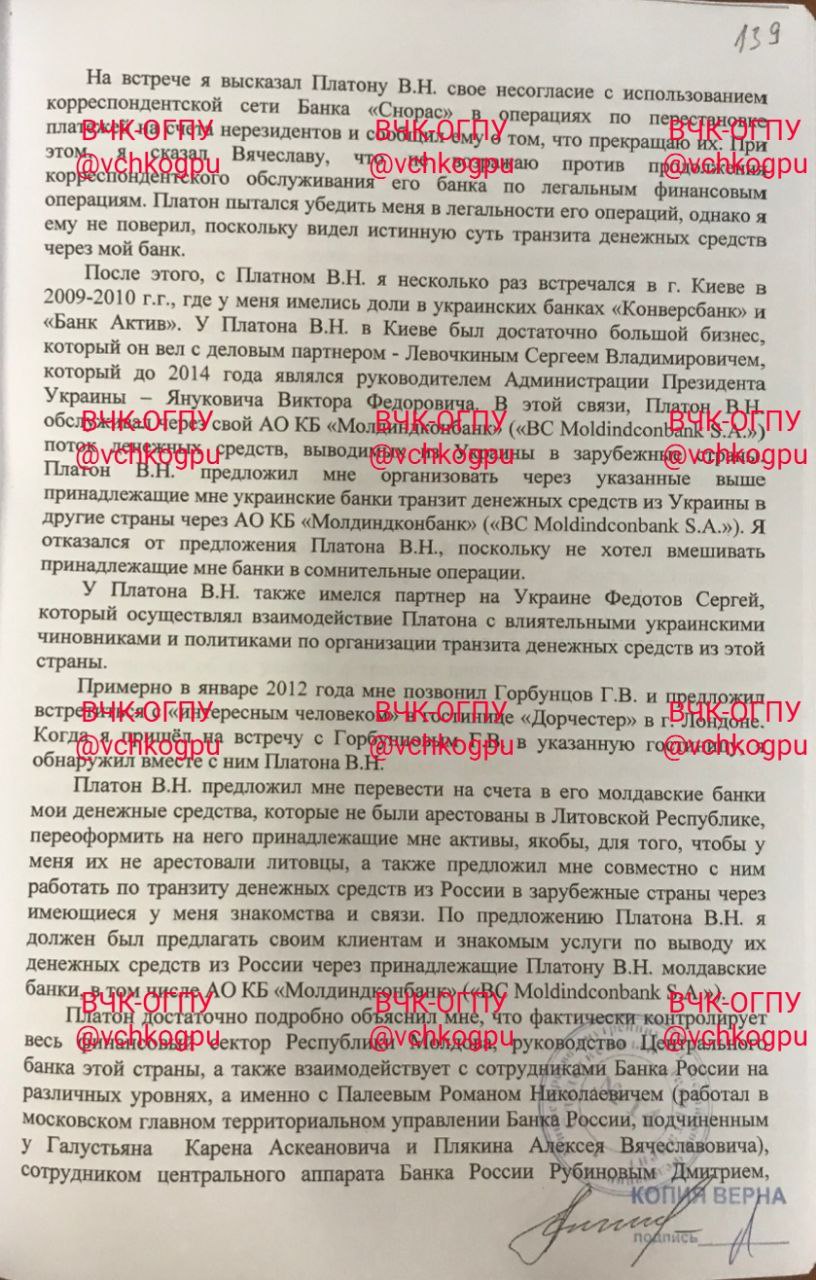
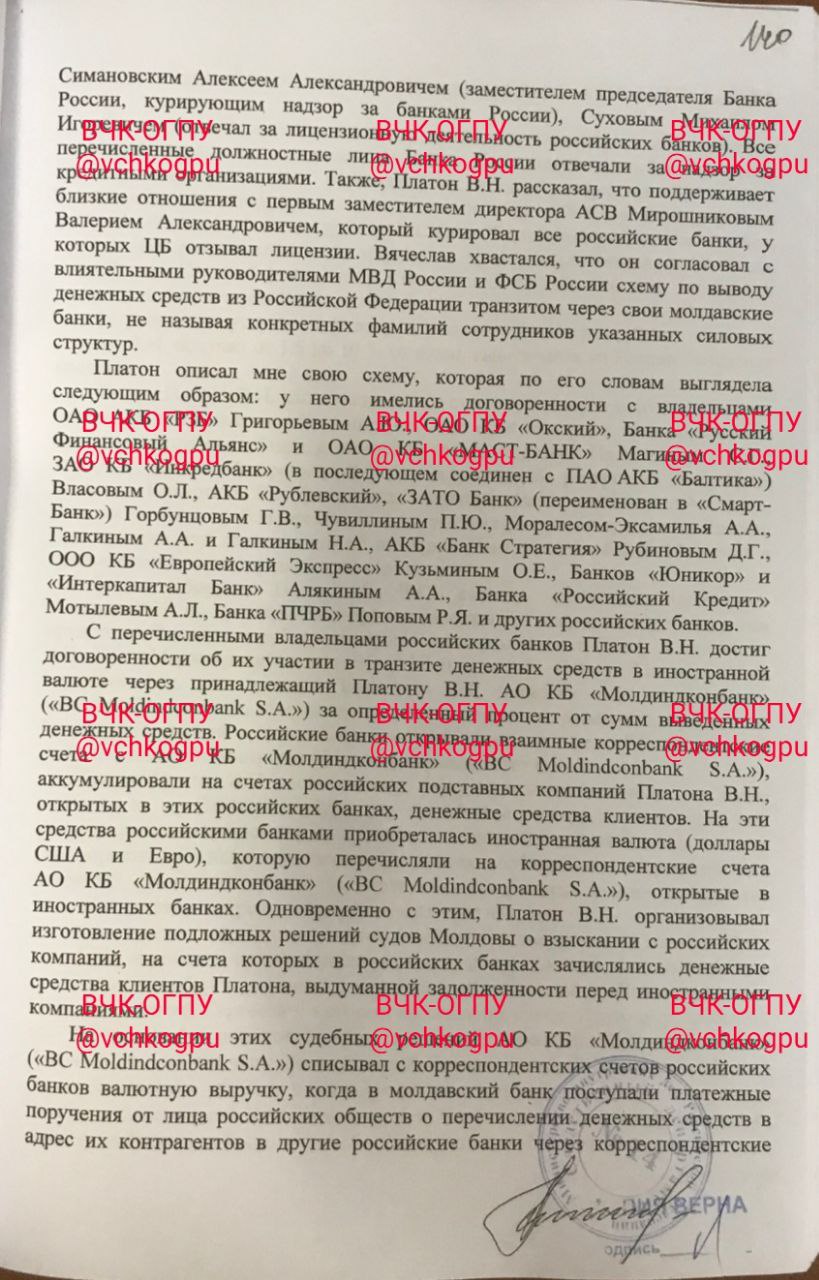
Продолжение следует
Тимофей Гришин
Источник: www.rucriminal.info

